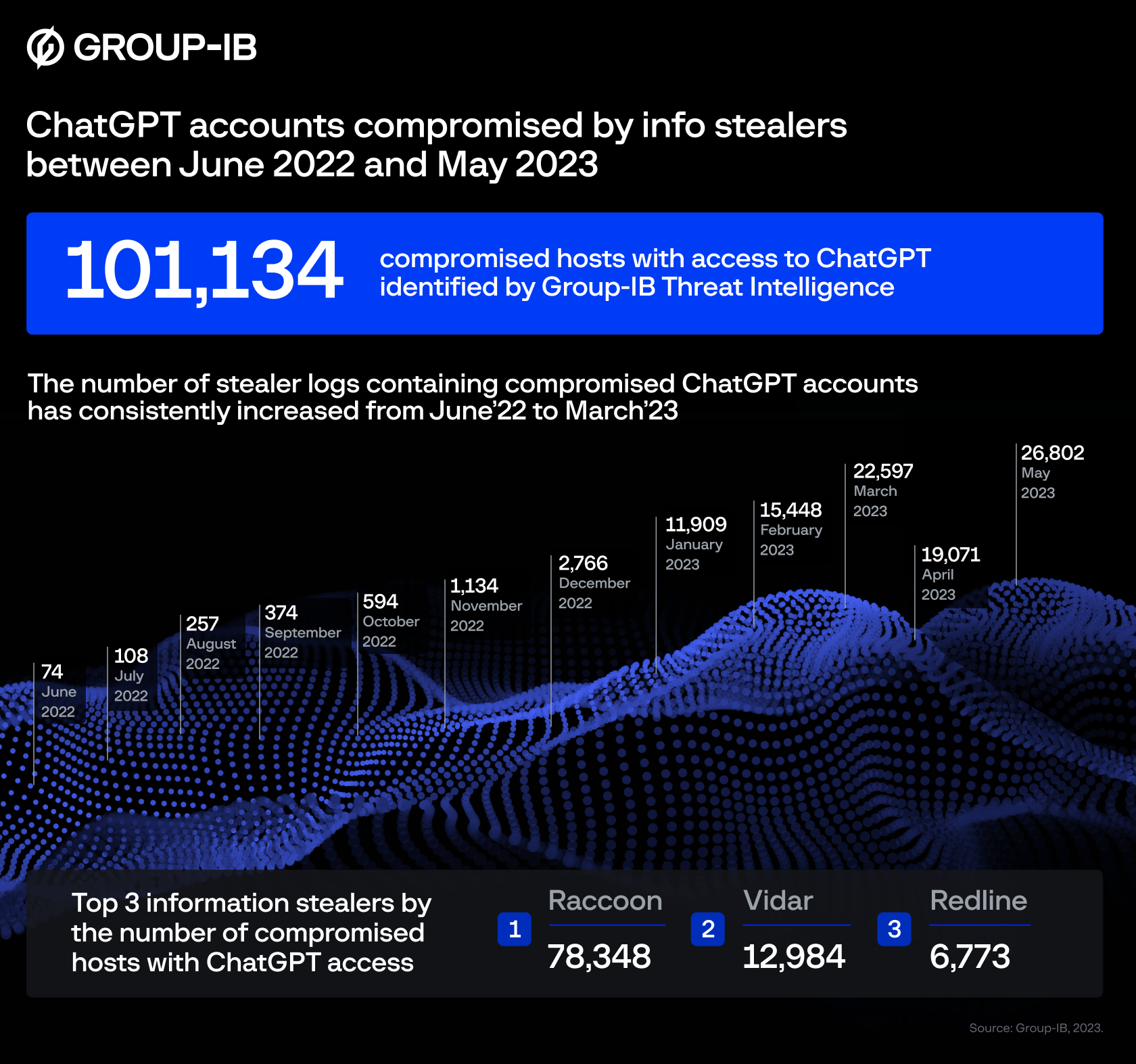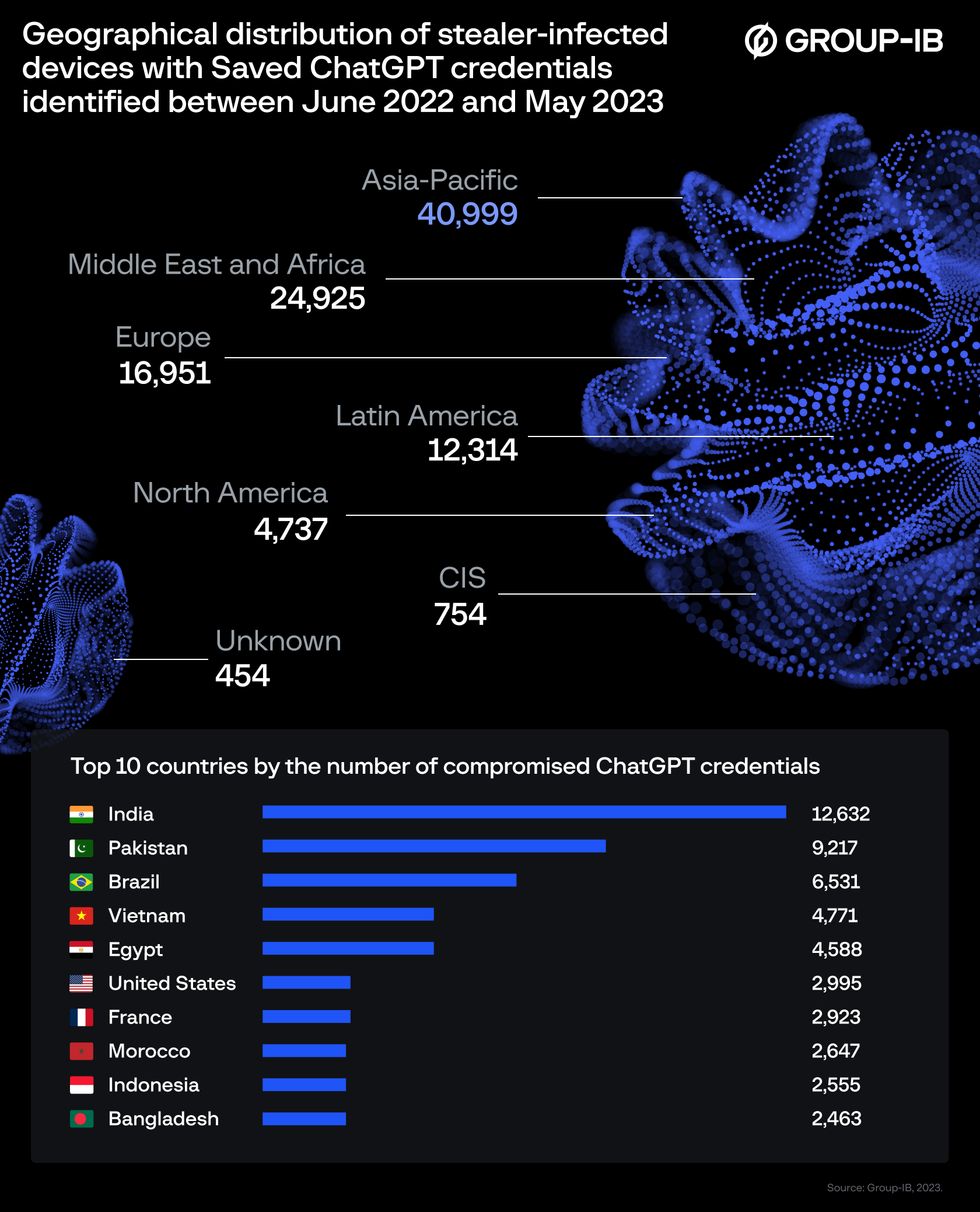News
100K+ Compromised ChatGPT Accounts Found On Dark Web
Egypt, Morocco, and Algeria top the list in the Middle Eastern region.

Global cybersecurity leader Group-IB has identified 101,134 infected devices with saved ChatGPT credentials. Throughout 2023, the company’s Threat Intelligence Platform found compromised account details in 26,802 malware logs traded on dark web marketplaces.

According to Group-IB’s findings, the Asia-Pacific region suffered the greatest concentration of ChatGPT credentials offered for sale, followed by the Middle East and Africa (MEA) region in second place.
Group-IB tech experts explained that when employees take advantage of ChatGPT to optimize business communications and marketing texts, the queries and responses are stored within the AI app. Consequently, any unauthorized access to a ChatGPT account could unearth a wealth of sensitive information.
Also Read: The Largest Data Breaches In The Middle East
Group-IB’s dark web analysis revealed that most compromised ChatGPT accounts were breached by a popular malware program known as “Raccoon Info Stealer”. The virus is often sent by email and can be used by hackers to gain access to sensitive data stored in internet browsers.
In the MENA area, accounts from users in Egypt, Morocco, Algeria, and Turkey topped the “most-infected” list, potentially exposing companies in the region to multiple threat actors.

“Many enterprises are integrating ChatGPT into their operational flow,” explained Dmitry Shestakov, Head of Threat Intelligence at Group-IB. “Employees enter classified correspondences or use the bot to optimize proprietary code. Given that ChatGPT’s standard configuration retains all conversations, this could inadvertently offer a trove of sensitive intelligence to threat actors if they obtain account credentials. At Group-IB, we continuously monitor underground communities to identify such accounts promptly”.
To mitigate the risks posed by compromised ChatGPT accounts, Group-IB suggests that users update passwords using current best practices while also implementing two-factor authentication.
News
Samsung Smart Glasses Teased For January, Software Reveal Imminent
According to Korean sources, the new wearable will launch alongside the Galaxy S25, with the accompanying software platform unveiled this December.

Samsung appears poised to introduce its highly anticipated smart glasses in January 2025, alongside the launch of the Galaxy S25. According to sources in Korea, the company will first reveal the accompanying software platform later this month.
As per a report from Yonhap News, Samsung’s unveiling strategy for the smart glasses echoes its approach with the Galaxy Ring earlier this year. The January showcase won’t constitute a full product launch but will likely feature teaser visuals at the Galaxy S25 event. A more detailed rollout could follow in subsequent months.
Just in: Samsung is set to unveil a prototype of its augmented reality (AR) glasses, currently in development, during the Galaxy S25 Unpacked event early next year, likely in the form of videos or images.
Additionally, prior to revealing the prototype, Samsung plans to introduce…
— Jukanlosreve (@Jukanlosreve) December 3, 2024
The Galaxy Ring, for example, debuted in January via a short presentation during Samsung’s Unpacked event. The full product unveiling came later at MWC in February, and the final release followed in July. Samsung seems to be adopting a similar phased approach with its smart glasses, which are expected to hit the market in the third quarter of 2025.
A Collaborative Software Effort
Samsung’s partnership with Google has played a key role in developing the smart glasses’ software. This collaboration was first announced in February 2023, with the device set to run on an Android-based platform. In July, the companies reiterated their plans to deliver an extended reality (XR) platform by the end of the year. The software specifics for the XR device are expected to be unveiled before the end of December.
Reports suggest that the smart glasses will resemble Ray-Ban Meta smart glasses in functionality. They won’t include a display but will weigh approximately 50 grams, emphasizing a lightweight, user-friendly design.
Feature Set And Compatibility
The glasses are rumored to integrate Google’s Gemini technology, alongside features like gesture recognition and potential payment capabilities. Samsung aims to create a seamless user experience by integrating the glasses with its broader Galaxy ecosystem, starting with the Galaxy S25, slated for release on January 22.


























